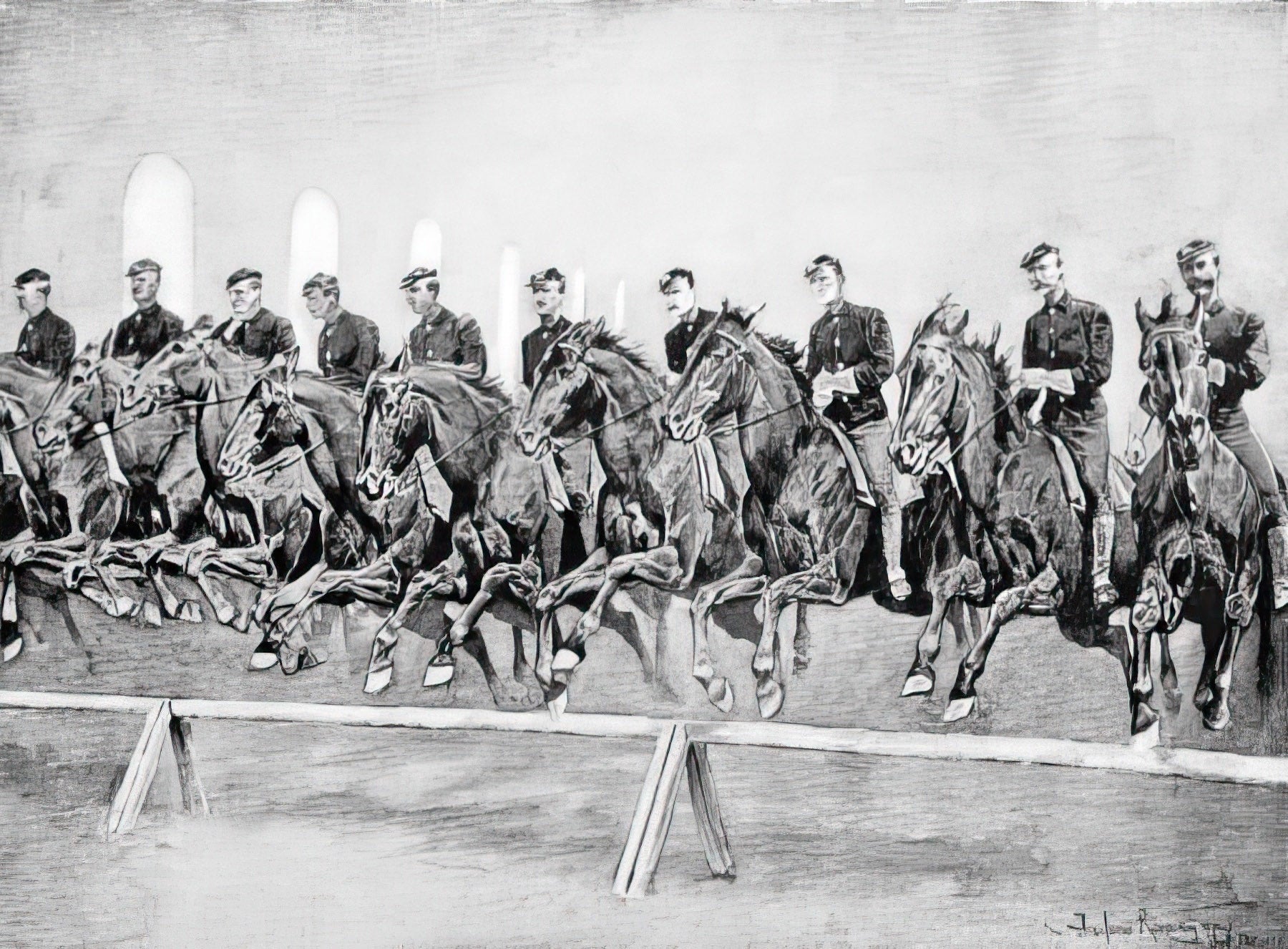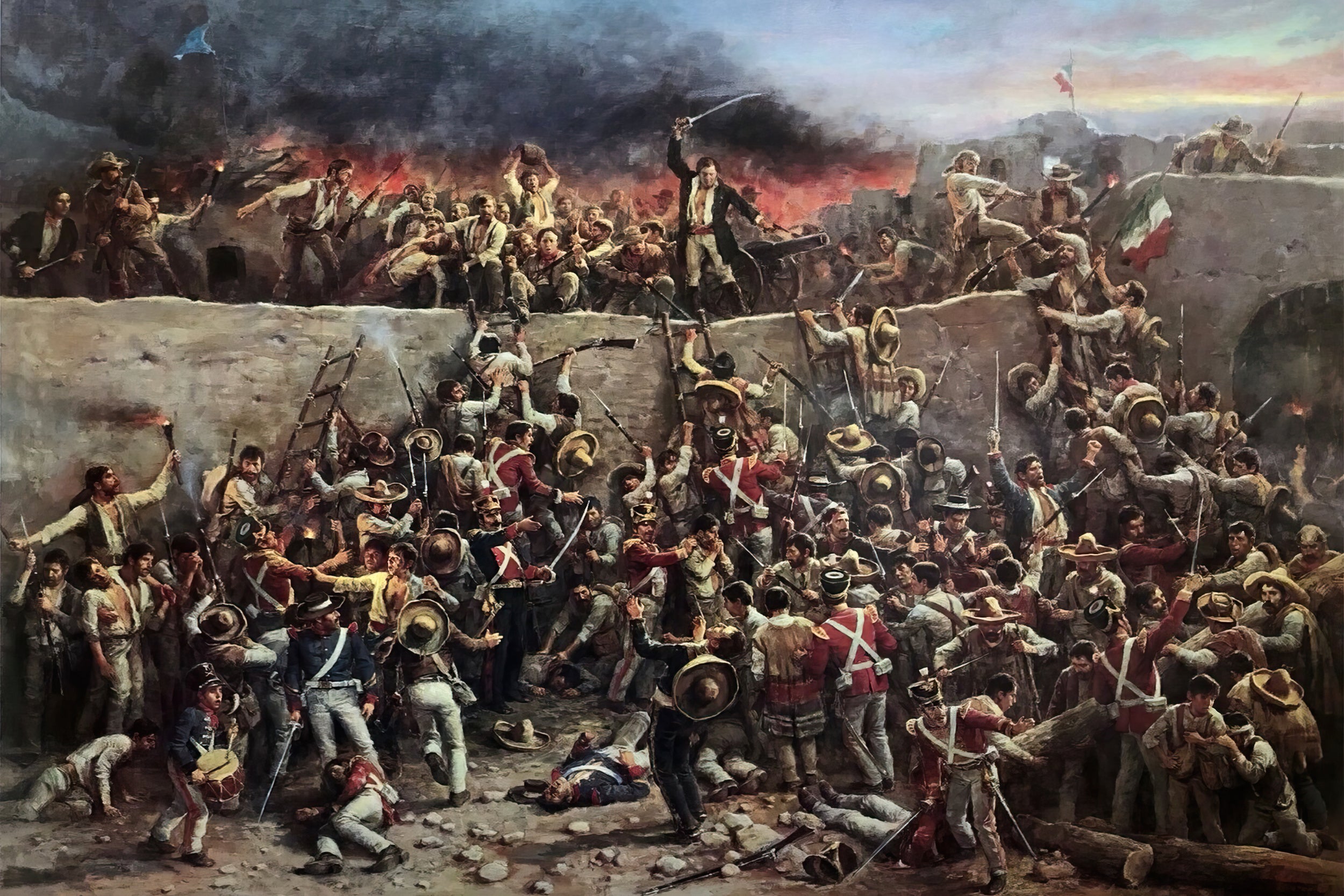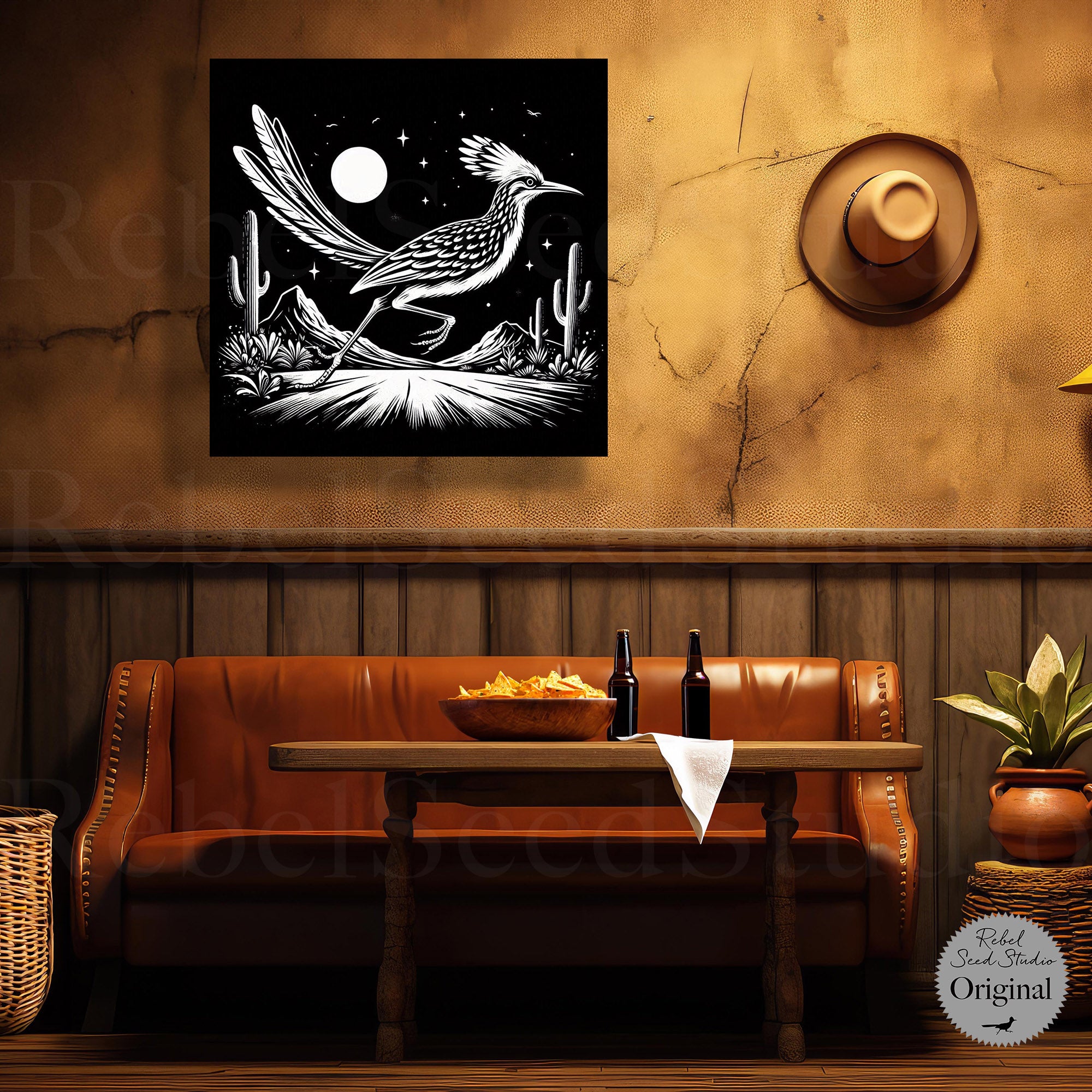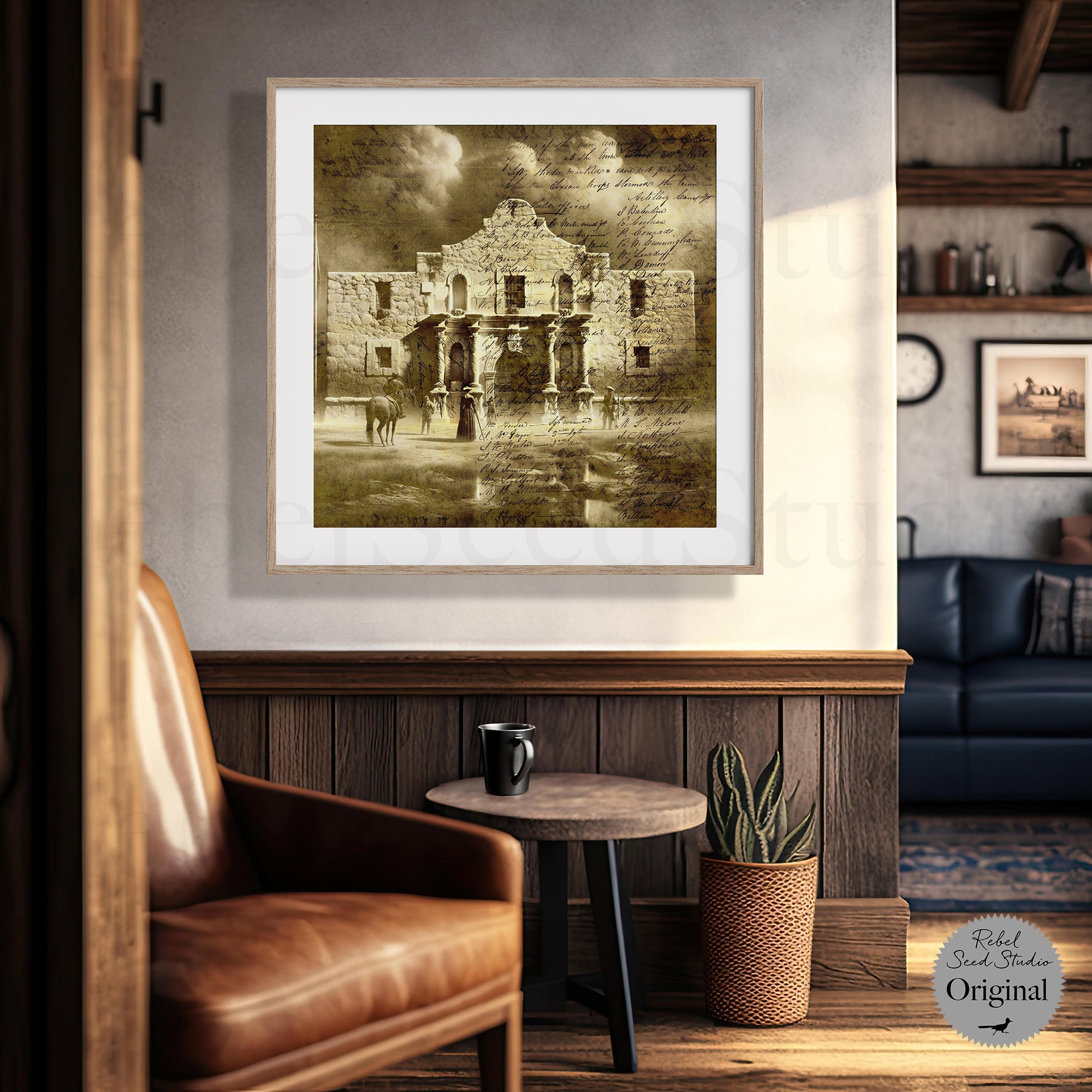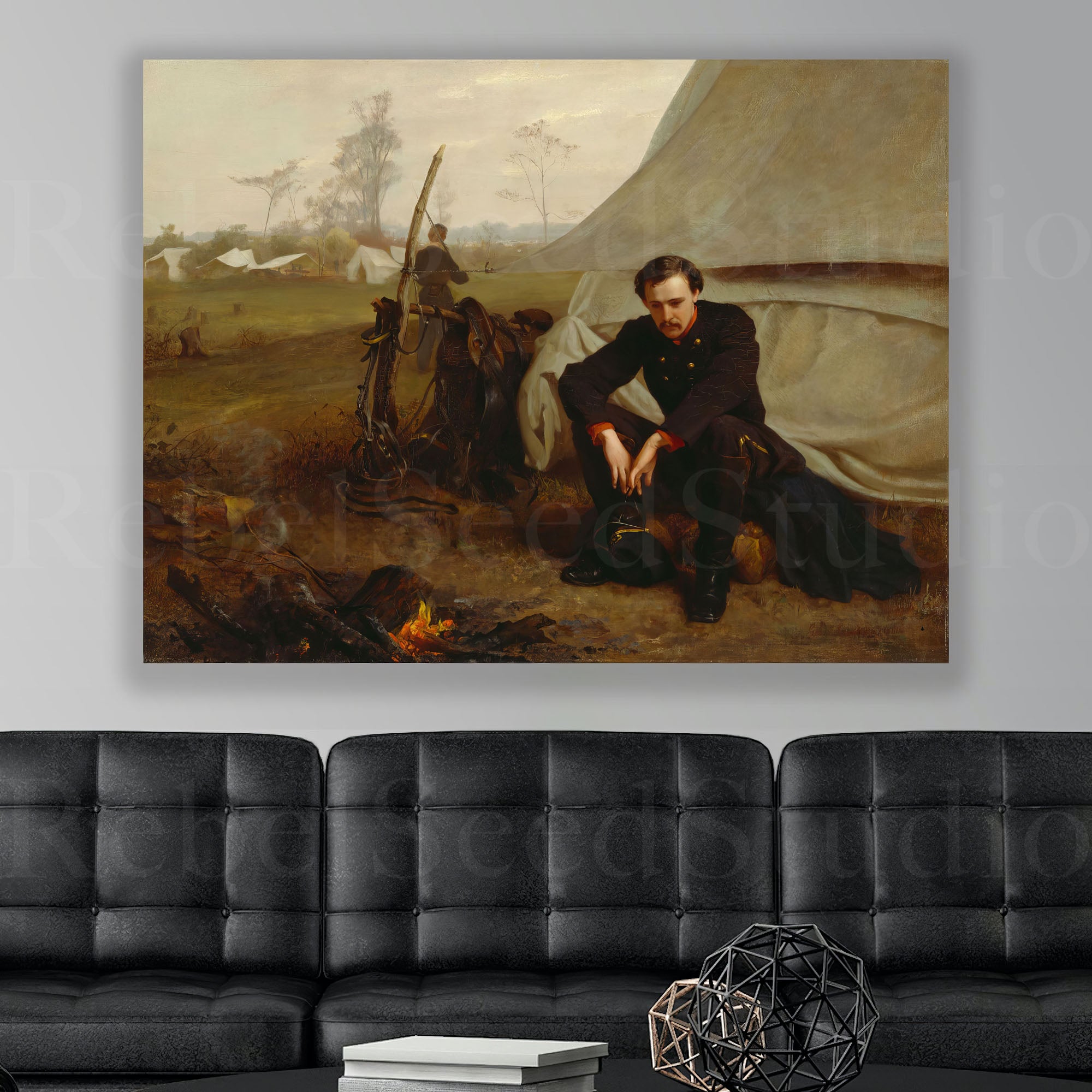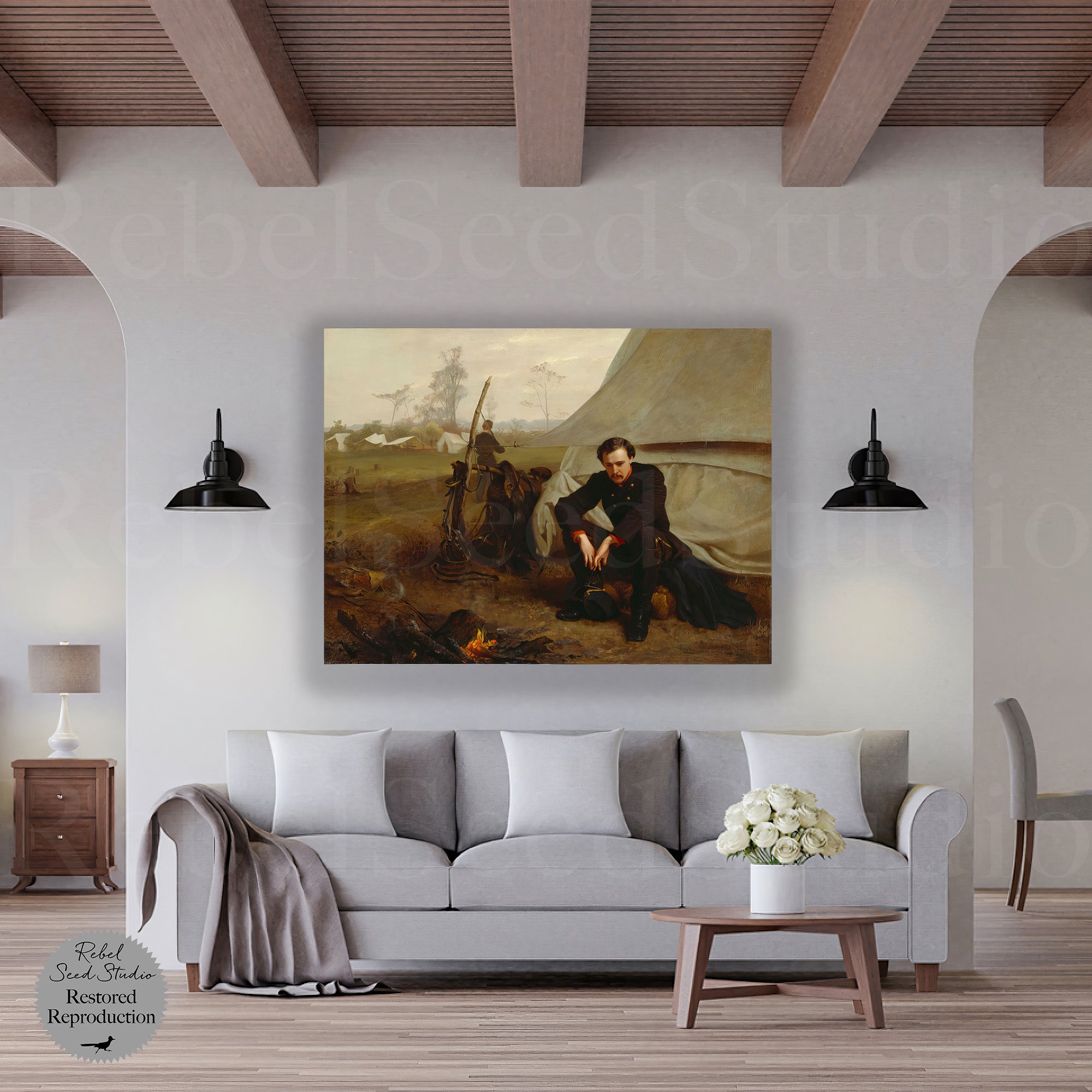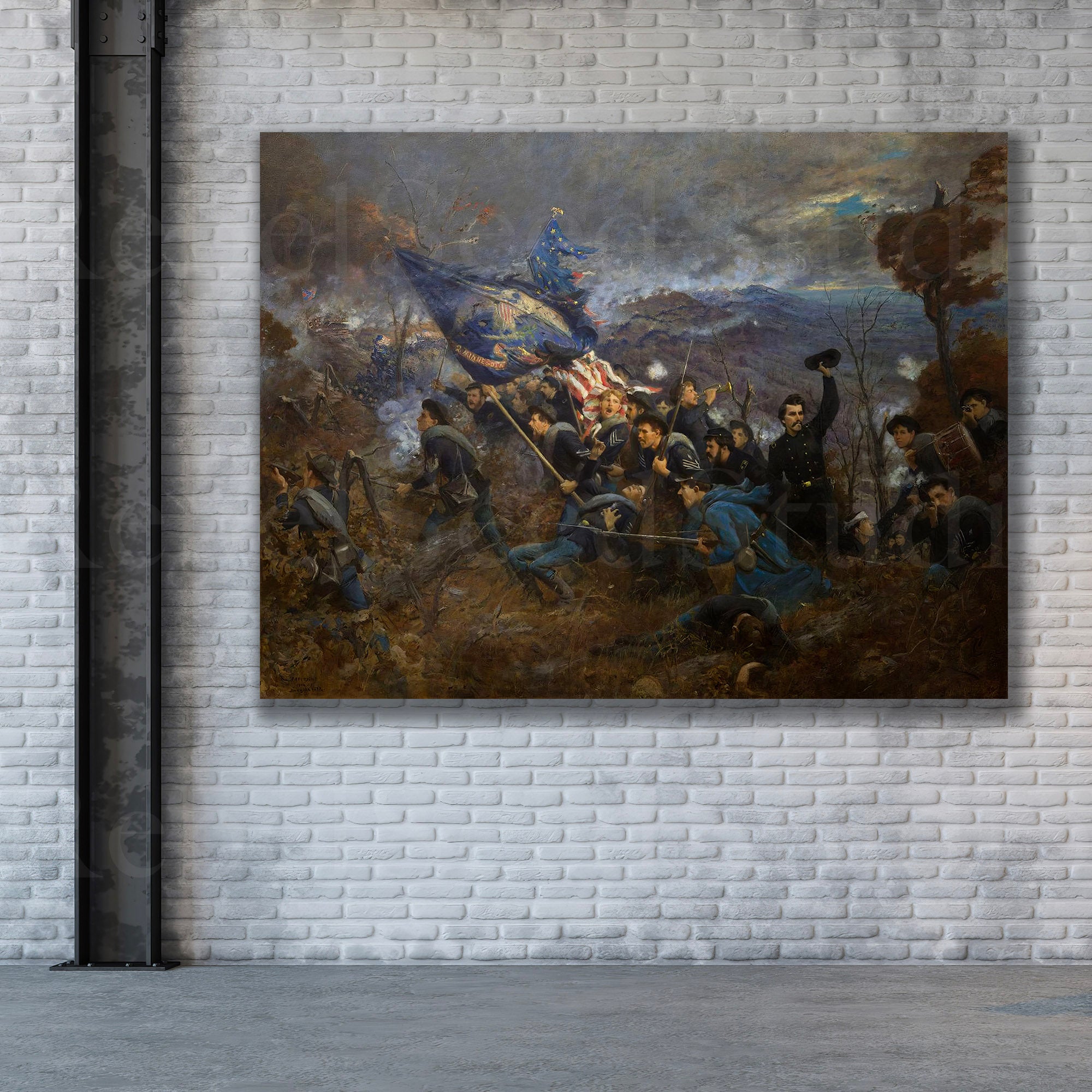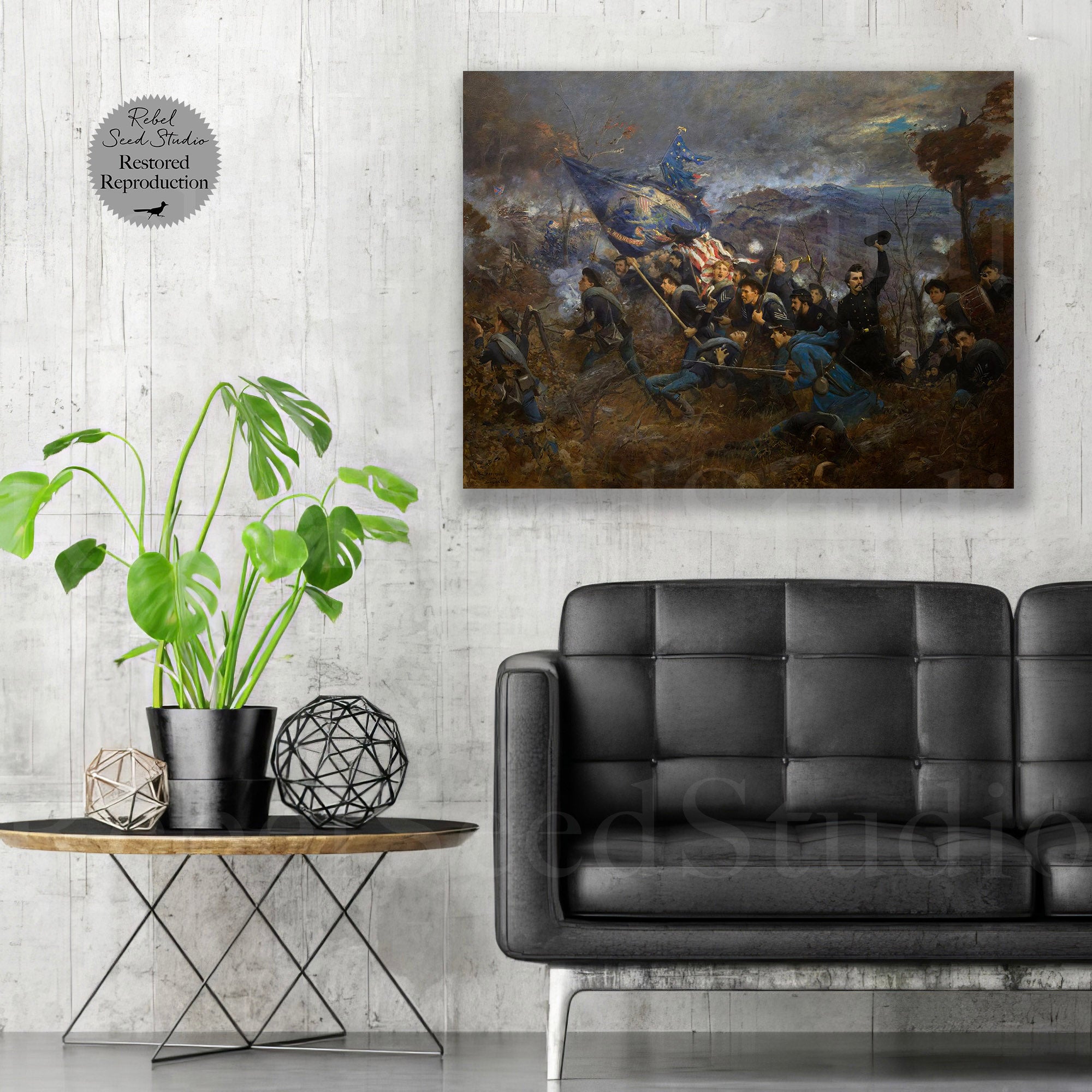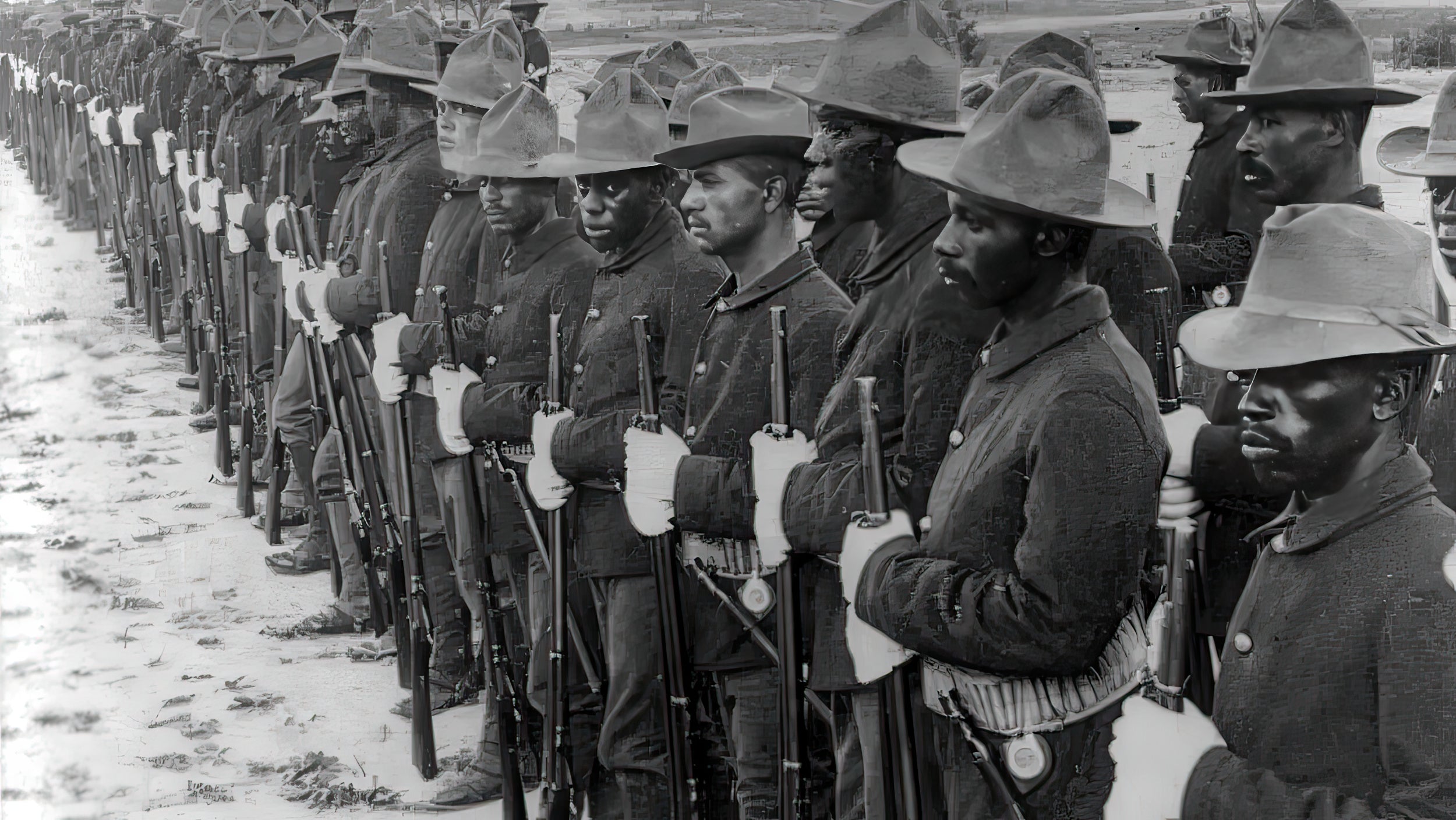
A Scout with the Buffalo Soldiers
Historical article reprinted from The Century, Volume 37, Issue 6, April 1889 (slightly abridged). Written & illustrated by Frederic Remington. Learn more about the 10th U.S. Cavalry.
I sat smoking in the quarters of an army friend at Fort Grant, and through a green latticework was watching the dusty parade and congratulating myself on the possession of this spot of comfort in such a disagreeably hot climate as Arizona Territory offers in the summer, when in strode my friend the lieutenant, who threw his cap on the table and began to roll a cigarette.
"Well," he said, "the K.O. has ordered me out for a two-week's scouting up the San Carlos way, and I'm off in the morning. Would you like to go with me?" He lighted the cigarette and paused for my reply.
I was very comfortable at that moment, and knew from some past experiences that marching under the summer sun of Arizona was real suffering and not to be considered by one on pleasure bent; and I was also aware that my friend the lieutenant had a reputation as a hard rider, and would in this case select a few picked and seasoned cavalrymen and rush over the worst possible country in the least possible time.
I had no reputation as a hard rider to sustain, and, moreover, had not backed a horse for the year past. I knew too that Uncle Sam's beans, black coffee, and the bacon which every old soldier will tell you about would fall to the lot of anyone who scouted with the 10th Dragoons. Still, I very much desired to travel through the country to the north, and in a rash moment said, "I'll go."
"You understand that you are amenable to discipline," continued the lieutenant with mock seriousness, as he regarded me with that soldier's contempt for a citizen which is not openly expressed but is tacitly felt.
"I do," I answered meekly.
"Put you afoot, citizen; put you afoot, sir, at the slightest provocation, understand," pursued the officer in his sharp manner of giving commands.
I suggested that, after I had chafed a government saddle for a day or two, I should undoubtedly beg to be put afoot, and, far from being a punishment, it might be a real mercy.
"That being settled, will you go down to stable-call and pick out a mount? You are one of the heavies, but I think we can outfit you," he said; and together we strolled down to where the bugle was blaring.
At the adobe corral the faded coats of the horses were being groomed by black troopers in white frocks; for the 10th United States Cavalry is composed of colored men. The fine alkaline dust of that country is continually sifting over all exposed objects, so that grooming becomes almost as hopeless a task as sweeping back the sea with a house broom. A fine old veteran cavalry-horse detailed for a sergeant of the troop, was selected to bear me on the trip. He was a large horse of a pony build, both strong and sound except that he bore a healed-up saddle- gore, gotten, probably, during some old march upon an endless Apache trail. Well satisfied with my mount, I departed.
On the following morning I was awakened and got up to array myself in my field costume. My old troop-horse was at the door, and he eyed his citizen rider with malevolent gaze. Even the dumb beasts of the army share that quiet contempt for the citizen, which is one manifestation of the military spirit, born of strength, and as old as when the first man went forth with purpose to conquer his neighbor man.
Down in front of the post-trader's was gathered the scouting party. A tall sergeant, grown old in the service, scarred on battlefield, hardened by long marches, - in short, a product of the camp - stood by his horse's head. Four enlisted men, picturesquely clad in the cavalry soldier's field costume, and two packers, mounted on diminutive bronco mules, were in charge of four pack-mules loaded with apperajos [rigs] and packs. This was our party. Presently the lieutenant issued from the headquarters' office and joined us. An orderly led up his horse.
"Mount," said the lieutenant; and swinging himself into his saddle he started off up the road. Out past the groups of adobe houses which constitute a frontier military village or post we rode, stopping to water our horses at the little creek, now nearly dry - the last water for many miles on our trail, and presently emerged upon the great desert. Together at the head of the little cavalcade rode the lieutenant and I, while behind, in single file, came the five troopers, sitting loosely in their saddles with the long stirrup of the United States cavalry seat, forage-hats set well over the eyes, and carbines, slickers, canteens, saddle-pockets, and lariats rattling at their sides.
Strung out behind were the four pack mules, now trotting demurely along, now stopping to feed, and occasionally making a solemn and evidently well-considered attempt to get out of line and regain the post which we were leaving behind. The packers brought up the rear, swinging their "blinds" and shouting at the lagging mules in a manner which evinced a close acquaintance with the character and peculiarities of each beast.
The sun was getting higher in the heavens and began to assert its full strength. The yellow dust rose about our horses' hoofs and settled again over the dry grass and mesquite bush. Stretching away on our right was the purple line of the Sierra Bonitas, growing bluer and bluer until lost in the hot scintillating atmosphere of the desert horizon. Overhead stretched the deep blue of the cloudless sky.
Presently we halted and dismounted to tighten the packs, which work loose after the first hour. One by one the packers caught the little mules, threw a blind over their eyes, and "Now, Whitey! Ready! eve-e-e-e -- gimme that loop," came from the men as they heaved and tossed the circling ropes in the mystic movements of the diamond hitch.

"All fast, Lieutenant," cries a packer, and mounting we move on up the long slope of the mesa towards the Sierras. We enter a break in the foothills, and the grade becomes steeper and steeper, until, at last, it rises at an astonishing angle. The slopes of the Sierra Bonitas are very steep, and as the air became more rarified as we toiled upward, I found that I was panting for breath. My horse - a veteran mountaineer - grunted in his efforts and drew his breath in long and labored blowing; consequently, I felt as though I was not doing anything unusual in puffing and blowing myself.
On the trail ahead I saw the lieutenant throw himself on the ground. I followed his example, for I was nearly "done for." I never had felt a rock as soft as the one I sat on. It was literally downy.
The old troop-horse heaved a great sigh, and dropping his head went fast asleep, as every good soldier should do when he finds the opportunity. The negro troopers sat about, their black skins shining with perspiration, and took no interest in the matter in hand. They occupied such time in joking and merriment as seemed fitted for growling. They may be tired, and they may be hungry, but they do not see fit to augment their misery by finding fault with everybody and everything. In this particular, they are charming men with whom to serve.
After a most frugal lunch we resumed our journey towards the clouds. Climbing many weary hours, we at last stood on the sharp ridge of the Sierra. Behind us we could see the great yellow plain of the Sulphur Spring Valley, and in front, stretching away, was that of the Gila, looking like a bed of a sea with the water gone.
Here we had a needed rest, and then began the descent on the other side. This was a new experience. The prospect of being suddenly overwhelmed by an avalanche of horseflesh as the result of some unlucky stumble makes the recruit constantly apprehensive. But the trained horses are sure of foot, understand the business, and seldom stumble except when the treacherous ground gives way. On the crest the prospect was very pleasant, as the pines there obscured the hot sun; but we suddenly left them for the scrub mesquite which bars your passage and reaches forth for you with its thorns when you attempt to go around.
We wound downward among the masses of rock for some time, when we suddenly found ourselves on a shelf of rock. We sought to avoid it by going up and around, but after a tiresome march we were still confronted by a drop of about a hundred feet. I gave up in despair; but the lieutenant after gazing at the unknown depths which were masked at the bottom by a thick growth of brush, said, "This is a good place to go down." I agreed that it was if you once got started; but personally, I did not care to take the tumble.
Taking his horse by the bits, the young officer began the descent. The slope was at an angle of at least sixty degrees, and was covered with loose dirt and boulders, with the mask of brush at the bottom concealing the awful possibilities of what might be beneath. The horse hesitated a moment, then cautiously put his head down and his leg forward and started. The loose earth crumbled, a great stone was precipitated to the bottom with a crash, the horse slid and floundered along. Had the situation not been so serious it would have been funny, because the angle of the incline was so great that the horse actually sat on his haunches like a dog.
"Come on!" shouted the redoubtable man of war and I started. My old horse took it unconcernedly, and we came down all right, bringing our share of dirt and stones and plunging through the wall of brush at the bottom to find our friend safe on the lower side. The men came along without so much as a look of interest in the proceeding. Down came the mules, without turning an ear, and then followed the packers, who, to my astonishment, rode down.
Our camp was pitched by a little mountain stream near a grassy hillside. The saddles, packs, and apperajos were laid on the ground and the horses and mules herded on the side of the hill by a trooper, who sat perched on a rock above them, carbine in hand. I was thoroughly tired and hungry, and did my share in creating the famine which it was clearly seen would reign in that camp ere long. We sat about the fire and talked. The genial glow seems to possess an occult quality: it warms the self-confidence of a man; it lulls his moral nature; and the stories which circulate about a campfire are always more interesting than authentic. Soldiers have no tents in that country, and we rolled ourselves in our blankets and, gazing up, saw the weird figure of the sentinel against the last red gleam of the sunset, and beyond that the great dome of the sky. Then we fell asleep.

When I awoke the next morning the hill across the canyon wall was flooded with a golden light, while the gray tints of our camp were steadily warming up. The soldiers had the two black camp-pails over the fire and were grooming the horses. Everyone was good-natured, as befits the beginning of the day. The tall sergeant was meditatively combing his hair with a currycomb; such delightful little unconventionalities are constantly observed about the camp. The coffee steamed up in our nostrils, and after a rub in the brook I pulled myself together and declared to my comrade that I felt as good as new. This was a palpable falsehood, as my labored movements revealed to the hard-sided cavalryman the sad effeminacy of the studio.
But our respite was brief, for almost before I knew it, I was again on my horse, following down the canyon after the black charger bestrided by the junior lieutenant of K troop. Over piles of rocks fit only for the touch and go of a goat, through the thick mesquite which threatened to wipe our hats off or to swish us from the saddle, with the air warming up and growing denser, we rode along. A great stretch of sandy desert could be seen, and I foresaw hot work.
In about an hour we were clear of the descent and could ride along together, so that conversation made the way more interesting. We dismounted to go down a steep drop from the high mesa into the valley of the Gila, and then began a day warmer even than imagination had anticipated. The awful glare of the sun on the desert, the clouds of white alkaline dust which drifted up until lost above, seemingly too fine to settle again, and the great heat cooking the ambition out of us, made the conversation lag and finally drop altogether.
The water in my canteen was hot and tasteless, and the barrel of my carbine, which I touched with my ungloved hand, was so heated that I quickly withdrew it. Across the hot-air waves which made the horizon rise and fall like the bosom of the ocean we could see a whirlwind or sandstorm winding up in a tall spiral until it was lost in the deep blue of the sky above. [These "dust-devils" are still common in southern Arizona.]
Lizards started here and there; a snake hissed a moment beside the trail, then sought the cover of a dry bush; the horses moved along with downcast heads and drooping ears. The men wore a solemn look as they rode along, and now and then one would nod as though giving over to sleep. The pack-mules no longer sought fresh feed along the way, but attended strictly to business. A short halt was made, and I alighted.
Upon remounting I threw myself violently from the saddle, and upon examination found that I had brushed up against a cactus and gotten my corduroys filled with thorns. The soldiers were overcome with glee at this episode, but they volunteered to help me pick them from my clothes. Thus, we marched all day, and with canteens empty we "pulled into" Fort Thomas that afternoon. [Fort Thomas was north of Fort Grant and less than a mile south of the Gila River.]
At the fort we enjoyed that hospitality which is a kind of freemasonry among army officers. But, for all that, Fort Thomas is an awful spot, hotter than any other place on the crust of the earth. The siroccos continually chase each other over the desert, the convalescent wait upon the sick, and the thermometer persistently reposes at the figures 125-degrees Fahrenheit. Soldiers are kept in the Gila Valley posts for only six months at a time before they are relieved, and they count the days.
On the following morning, at an early hour, we waved adieus to our kind friends and took our way down the valley. If the impression is abroad that a cavalry soldier's life in the Southwest has any of the lawn-party element in it, I think the impression could be effaced by doing a march like that. The great clouds of dust choke you and settle over horse, soldier, and accouterments until all local color is lost and black man and white man wear a common hue.
The "chug, chug, chug" of your tired horse as he marches along becomes infinitely tiresome, and cavalry soldiers never ease themselves in the saddle. No pains are spared to prolong the usefulness of an army horse, and every old soldier knows that his good care will tell when the long, forced march comes someday, and when to be put afoot by a poor mount means great danger in Indian warfare. The soldier will steal for his horse, will share his camp bread, and will moisten the horse's nostrils and lips with the precious water in the canteen.
Through a little opening in the trees, we see a camp and stop in front of it. A few mesquite trees, two tents, and some sheds made of boughs beside an acequia make up the background. By the cooking-fire lounge two or three rough frontiersmen, veritable pirates in appearance, with rough flannel shirts, slouch hats, brown canvas overalls, and an unkempt air; but suddenly, to my intense astonishment, they rise, stand in their tracks as immovable as graven images, and salute the lieutenant; then these men were soldiers!
It was a camp of instruction for Indians and a post of observation. They were nice fellows and did everything in their power to entertain the cavalry. We were given a tent, and one man cooked the army rations in such strange shapes and mysterious ways that we marveled as we ate. After dinner we lay on our blankets watched the groups of San Carlos Apaches who came to look at us. Some of them knew the lieutenant, with whom they had served and whom they now addressed as "Young Chief."
They would point him out to others with great zest. Great excitement prevailed when it was discovered that I was using a sketchbook, and I was forced to disclose the half-finished visage of one villainous face to their gaze. It was straightway torn up, and I was requested with many scowls and grunts, to discontinue that pastime, for Apaches more than any other Indians dislike to have their portraits made.
All along the Gila Valley can be seen the courses of stone which were the foundations of the houses of a dense population long since passed away. The lines of old irrigating ditches were easily traced, and one is forced to wonder at the changes in Nature, for at the present time there is not water sufficient to irrigate land necessary for the support of as large a population as probably existed at some remote period.

We "raised" some foothills, and could see in the far distance the great flat plain, the buildings of the San Carlos agency, and the white canvas of the cantonment. Nearer and nearer shone the white lines of tents until we drew rein in the square where officers crowded around to greet us. The jolly post-commander, the senior captain of the 10th, insisted upon my accepting the hospitalities of his "large hotel," as he called his field tent, on the ground that I too was a New Yorker. Right glad have I been ever since that I accepted his courtesy, for he entertained me in the true frontier style.
Being now out of the range of country known to our command, a lieutenant in the same regiment was detailed to accompany us beyond. This gentleman was a character. The best part of his life had been spent in this rough country, and he had so long associated with Apache scouts that his habits while on a trail were exactly those of an Indian. I jocosely insisted that Lieutenant Jim only needed a breech clout, and long hair, in order to draw rations at the agency. In the morning, as we started under his guidance, he was a spectacle.
He wore shoes and a white shirt, and carried absolutely nothing in the shape of canteens and other "plunder" which usually constitute a cavalryman's kit. He was mounted on a little runt of a pony so thin and woebegone as to be remarkable among his kind. It was insufferably hot as we followed our queer guide up a dry canyon, which cut off the breeze from all sides and was a veritable human frying-pan. I marched next to our leader, and all day long the patter, patter of that Indian pony, bearing his tireless rider, made an aggravating display of insensibility to fatigue, heat, dust, and climbing. On we marched over the rolling hills, dry, parched, desolate, covered with cactus and loose stones.
When we reached water and camp that night our ascetic leader had his first drink. It was a long one and a strong one, but at last he arose from the pool and with a smile remarked his "canteens were full." Officers in the regiment say that no one will give Lieutenant Jim a drink from his canteen, but this does not change his habit of not carrying one; nevertheless, by the exercise of self-denial, which is at times heroic, he manages to pull through. They say that he sometimes fills an old meat-tin with water in anticipation of a long march, and stories which try credulity are told of the amount of water he has drunk at times.
Yuma Apaches come into camp, shake hands gravely with everyone, and then in their Indian way begin the inevitable inquiries as to how the coffee and flour are holding out. The campfire darts and crackles, the soldiers gather round it, eat, joke, and bring out the greasy pack of cards. The officers gossip of army affairs, while I lie on my blankets, smoking and trying to establish relations with a very small and very dirty little Yuma Apache, who sits near me and gazes with sparkling eyes at the strange object which I undoubtedly seem to him.
It seems but an instant before a glare of sun strikes my eyes, and I am awake for another day. I am mentally quarreling with that insane desire to march which I know possesses Lieutenant Jim; but it is useless to expostulate, and before many hours the little pony constantly moving along ahead of me becomes a part of my life. There he goes. I can see him now - always moving briskly along, pattering over the level, trotting up the dry bed of a stream, disappearing into the dense chaparral thicket that covers a steep hillside, jumping rocks, and doing everything but "halt."
We are now in the high hills, and the air is cooler. The chaparral is thicker, the ground is broken into a succession of ridges, and the volcanic boulders pile up in formidable shapes. My girth loosens and I dismount to fix it. The command moves on and is lost to sight in a deep ravine. Presently I resume my journey, and in the meshwork of ravines I find that I no longer see the trail of the column. I retrace and climb and slide down hill, forcing my way through chaparral, and after a long time I see the pack-mules go out of sight far away on a mountain slope. The blue peaks of the Pinals tower away on my left, and I begin to indulge in mean thoughts concerning the indomitable spirit of Lieutenant Jim, for I know he will take us clear over the top of that pale blue line of far-distant mountains.
In course of time, I came up with the command, which had stopped at a ledge so steep that it had daunted even these mountaineers. It was only a hundred-foot drop, and they presently found a place to go down, where, as one soldier suggested, "there isn't footing for a lizard." On we go, when suddenly with a great crash some sandy ground gives way, and a collection of hoofs, troop-boots, ropes, canteens, and flying stirrups goes rolling over in a cloud of dust and finds lodgment in the bottom of a dry watercourse. The dust settles and discloses a soldier and his horse.
They rise to their feet and appear astonished, but as the soldier mounts and follows on we know he is unhurt. Now a coyote, surprised by our cavalcade and unable to get up the ledge, runs along the opposite side of the canyon wall. "Pop, pop, pop, pop" go the six-shooters, and then follow explanations by each marksman of the particular thing which made him miss.
That night we were forced to make a "dry camp"; that is, one where no water is to be found. There is such an amount of misery locked up in the thought of a dry camp that I refuse to dwell upon it.
We were glad enough to get upon the trail in the morning, and in time found a nice running mountain-brook. The command wallowed in it. We drank as much as we could hold and then sat down. We arose and drank some more, and yet we drank again, and still once more, until we were literally water-logged.
Lieutenant Jim became uneasy, so we took up our march. We were always resuming the march when all nature called aloud for rest. We climbed straight up impossible places. The air grew chill, and in a gorge a cold wind blew briskly down to supply the hot air rising from sands of the mesa far below.
That night we made a camp, and the only place where I could make my bed was on a great flat rock. We were now among the pines, which towered above us. The horses were constantly losing one another in the timber in their search for grass, in consequence of which they whinnied, while the mules brayed, and made the mountain hideous with sound.
By another long climb we reached the extreme peaks of the Pinal range, and there before us was spread a view which was grand enough to compensate us for the labor. Beginning in "gray reds," range after range of mountains, overlapping each other, grow purple and finally lose themselves in pale blues. We sat on a ledge and gazed. The soldiers were interested, though their remarks about the scenery somehow did not seem to express an appreciation of the grandeur of the view which impressed itself strongly upon us. Finally, one fellow, less aesthetic than his mates, broke the spell by a request for chewing-tobacco, so we left off dreaming and started on.
That day Lieutenant Jim lost his bearings and called upon that instinct which he had acquired in his life among the Indians. He "cut the signs" of old Indian trails and felt the course to be in a certain direction - which was undoubtedly correct, but it took us over the highest points of the Mescal range. My shoes were beginning to give out, and the troop-boots of several soldiers threatened to disintegrate.
One soldier, more ingenious than the rest, took out some horse-shoe nails and cleverly mended his boot-gear. At times we wound around great slopes where a loose stone or the giving way of bad ground would have precipitated horse and rider a thousand feet below. Only the courage of the horses brings one safely through. The mules suffered badly.
At last, we reached the Gila, and nearly drowned a pack-mule and two troopers in the quicksand. We began to pass Indian huts, and saw them gathering wheat in the river bottoms, while they paused to gaze at us and doubtless wondered for what purpose the buffalo-soldiers were abroad in the land. The cantonment appeared, and I was duly gratified when we reached it.
I hobbled up to the "Grand Hotel" of my host the captain, who laughed heartily at my floundering movements and observed my nose and cheeks, from which the sun had peeled the skin, with evident relish at the thought of how I had been used by his lieutenant. At his suggestion I was made an honorary member of the cavalry, and duly admonished "not to trifle again with the 10th Nubian Horse if I expected any mercy."
In due time the march continued without particular incident, and at last the scout "pulled in" to the home post, and I again sat in my easy chair behind the latticework, firm in the conviction that soldiers, like other men, find more hard work than glory in their calling.


